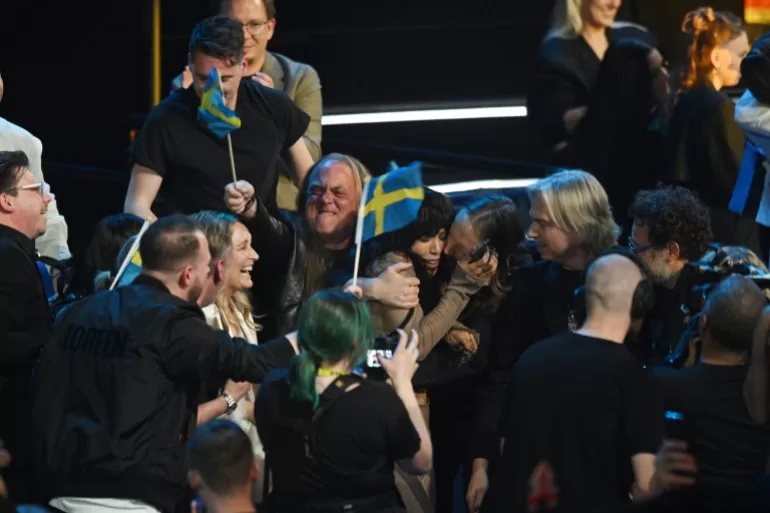But Israel’s war on Gaza has taken centre stage in the usually nonpolitical contest because of a row over the Israeli entry.
In February, the European Broadcasting Union (EBU), the organisers of the contest, rejected Israel’s entry, a song called October Rain, on the grounds that it referenced the victims of the October 7 Hamas attacks on southern Israel and was, therefore, too political.
Israel, which will be competing in the competition’s second semifinal on May 9 in the hopes of reaching the grand final two days later in Malmo, Sweden, initially declined to rework the song. But on Sunday, the country’s 20-year-old entrant, Eden Golan, performed Hurricane, a revised version of October Rain, live on Israeli TV.
Palestinian supporters, however, are calling for Israel to be expelled from the contest altogether.

How has Israel’s song changed?
The original song included lines such as “Writers of the history/Stand with me,” “I’m still wet from this October rain/October rain,” “There’s no air left to breathe” and “They were all good children, each one of them.” These were deemed by Eurovision organisers to be too politically charged and a none-too-subtle reference to the Hamas assault, during which 1,139 Israelis were killed.
At first, Israeli public broadcaster Kan, which is responsible for choosing the country’s entry, refused to accept the EBU’s ruling. But after Israeli President Isaac Herzog intervened, Kan dropped its opposition.
The public broadcaster said: “The president emphasised that at this time in particular, when those who hate us seek to push aside and boycott the state of Israel from every stage, Israel must sound its voice with pride and its head high and raise its flag in every world forum, especially this year.”
Kan said the new song is a romantic ballad, featuring lyrics like “Dancing in the storm, I got nothing to hide/Take it out and leave the world behind/Baby, promise me you hold me again/I’m still taken from this hurricane.”
Hurricane retains the same melody as the disqualified October Rain.
What was the reaction to the new song in Israel?
When Hurricane was announced as the new song entry on Sunday, Golan herself remarked: “I ended up [competing] in a not simple year.”
“But on the other hand”, she added, “I even more so want to represent the country this year because of its meaning. It has a totally different significance. And we can bring everything we’re feeling and everything the country is going through in those three minutes – to speak through the song to the world.”
In Israel – which has hosted Eurovision three times (in 1979, 1999 and 2019) and won it on four occasions (in 1978, 1979, 1998 and 2018) since it made its debut in 1973 – emotions are running deep.
Dudi Fatimer, writing in The Jerusalem Report on Tuesday, panned Hurricane as “boring” and “mundane”.
“Another glaring flaw is that except for a sentence or two in Hebrew that Golan sings, it’s all in English,” Fatimer added. “Generally, I understand the need for English, but in a period where Israeli existence is in existential danger, a song that’s entirely or mostly in Hebrew carries an explanatory message, and Golan in this competition is here to perform, not to explain to us (she has no chance of winning, not even remotely).”
How have pro-Palestinian campaigners reacted?
The Palestinian Campaign for the Academic and Cultural Boycott of Israel (PACBI) has urged a boycott of this year’s Eurovision. In January, more than 1,400 professional musicians from Finland signed a petition calling for the EBU to expel Israel from the competition.
But last month, the EBU’s director general, Noel Curran, said Israel would remain in the competition.
“The Eurovision Song Contest is a nonpolitical music event and a competition between public service broadcasters who are members of the EBU,” Curran said. “It is not a contest between governments.”
Some have raised parallels with the 2022 EBU decision to expel Russia after its full-scale invasion of Ukraine that year, but Curran rejected the comparison.
“In the case of Russia, the Russian broadcasters themselves were suspended from the EBU due to their persistent breaches of membership obligations and the violation of public service values,” he said.

Have there been objections to Israel’s participation before?
When the Israeli city of Tel Aviv hosted the Eurovision finals in 2019, pro-Palestinian activists described Eurovision as an exercise in “artwashing apartheid”.
That year, campaigners held their own version – GlobalVision – in a bid to highlight the Israeli occupation of Palestinian lands. Held on the same day as Eurovision, GlobalVision livestreamed performances by international artists in the occupied West Bank, Haifa, London and Dublin.
During Eurovision 2019, Iceland’s entry, Hatari, incurred the wrath of the EBU after displaying scarves adorned with Palestinian flags, for which RÚV, Iceland’s national broadcaster, was fined 5,000 euros ($5,456). This year, Palestinian singer Bashar Murad competed to represent Iceland at Eurovision but was beaten by Icelandic singer Hera Bjork.
Is Israel the only non-European country to take part?
Israel was permitted entry into Eurovision more than 50 years ago because the country’s national broadcaster was – and is – a member of the EBU.
In fact, any country in the world may participate in the contest as long as it has a broadcaster that operates within Europe as part of the EBU.
Australia, which has long had a committed Eurovision fan base, was admitted in 2015. Armenia joined the contest in 2006 while Azerbaijan joined in 2011.
Arabic-speaking countries, by contrast, have had limited involvement with the competition. In 1980, Morocco participated for the first and only time with the only Arabic song ever to have featured in the contest. Tunisia and Lebanon pulled out in 1977 and 2005 respectively after they refused to broadcast content from the Israeli state.
